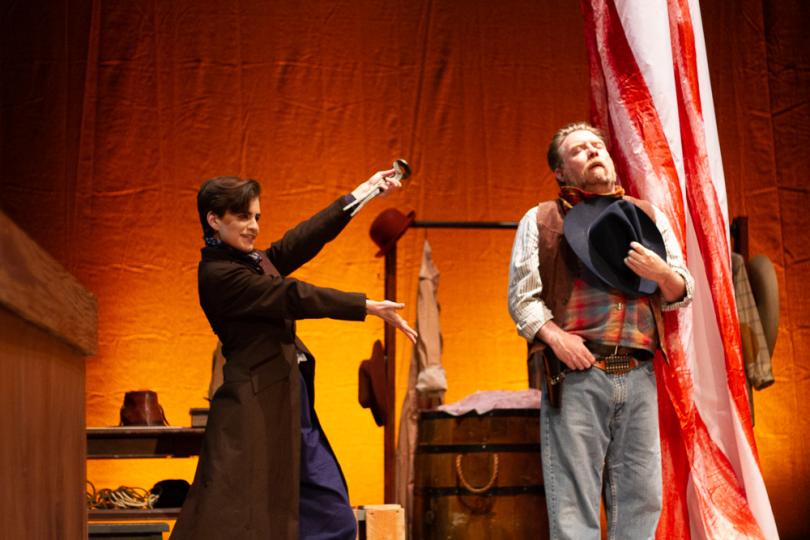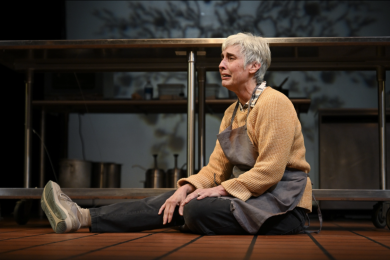A Case for Creativity, Collaboration, and Comedy

The Pathetic Life and Remarkable Afterlife of Elmer McCurdy, the Worst Robber in the West delivers on its outlandish run-around title. An evening of humor with a little something for every comedic appetite, director Liz Neerland crafts an evening of theatre that blends the ridiculousness of fantasy with the grime of the Wild West, and the ensemble cast looks to be having as much fun as the audience as they switch characters, costumes, dialects, and even time periods throughout the show. Further, Josh Cragun’s script contains gems specific enough to tickle Twin Cities locals while still winking and nodding to more universal jokes and cringe-worthy puns. Elmer McCurdy stands as a farcical melodrama supported by an unexpectedly insightful commentary on the evolution of media and storytelling.
Stepping into The Crane to catch nimbus theatre’s latest original work resembles falling down a country western rabbit hole. Upon landing we see Ursula K. Bowden’s half-carnival-half-saloon placing us distinctly in the American West: neutral colors but for the red and white striped circus tents draped artfully and practically about the space, and even a Wurlitzer style piano jukebox backtrack provided by sound designer Jacob M. Davis. Practical effects are woven throughout the production – no spoilers – and are supported seamlessly by Mitchell Frasier’s lighting design (it wouldn’t be a western without a dusty sunset) and Davis’s sound. Rubble&Ash’s simple but specific costumes enable the six-person ensemble to morph between roles as they create the world of Elmer McCurdy’s pathetic life and that of his remarkable afterlife.
We bounce back and forth between various decades of the early 20th century as we unpack the story of this underwhelming bandit. Elmer McCurdy (Sam Landman) leads an outlaw gang known as “The Okla-hombres” whose infamy, history, and legacy are highly debatable. Trusty sidekicks Grits Crabcake (Derek Dirlam) and Lil’ Britches (Boo Segersin) follow their unlikely leader through a series of heists and stick-ups portrayed in flashbacks throughout the play. These flashbacks interrupt the central narrative which follows McCurdy’s famous corpse as it changes hands and becomes a greater and greater viewing attraction in the American plains states. Ensemble members Song Kim, Laura Mason, and Lily Noonan craft a variety of characters who buy, sell, and trade McCurdy’s body over the years while adapting the famous outlaw's story to the changing and shifting times. McCurdy’s corpse, and thereby the Okla-hombre legacy, moves from funeral home, to carnival show, to wax museum, to silent film, to TV show, to major motion picture, to Spaghetti Western. It’s a mouthful to put into words, but Cragun’s script details the narrative while providing a provocative commentary on the nature and history of entertainment while remaining entertaining itself.
The beauty of nimbus theatre’s process – for those (like me) who have never been to a nimbus production – is that their scripts are created through actor, director, playwright development. Rather than a director casting actors in a script written by a single author, the ensemble crafts the storyline around a core concept. Then the playwright encapsulates the ideas, bits, and dialogue germinated by the company in a final script that can be rehearsed and performed. This distinctive form of conception allows for comedic specificity, like the scene where two sibling carnival owners come to purchase Elmer McCurdy’s body from a funeral home director. The “siblings” (Song Kim and Laura Mason) are of two obviously different ethnicities which prompts the funeral director (Lily Noonan) to ask “your sister?” and receive the reply “…she’s adopted.” Jokes like these, crafted around the unique identities of individual actors, add intimacy to humor, and another layer to the comedy.
As audiences chuckle and groan at wordplay and self-referential humor, the primary desire I had was more. More physical comedy, more audience interaction, more meta-theatre. This production is full of funny mechanics, wit, and unexpected parody; I simply wanted a bit more slapstick or stylized comedy on the physical side of storytelling. Elmer McCurdy could withstand the boos and hisses of a traditional melodrama audience, and it might illicit them if it ramped up its already solid brand of clowning.
Nimbus theatre made a strong case for itself and its collaborative process in this production. Usually I cringe at ensemble-created theatre, as most that I’ve seen tends towards being sentimental and precious, or all inside-humor and performer glorification. This production does none of that; Neerland’s directing hand carefully puts together the performance and technical pieces of the puzzle which fit precisely together. The Pathetic Life and Remarkable Afterlife of Elmer McCurdy, the Worst Robber in the West provides audiences some food for thought without ever sacrificing its light-hearted and earnest comedy.




